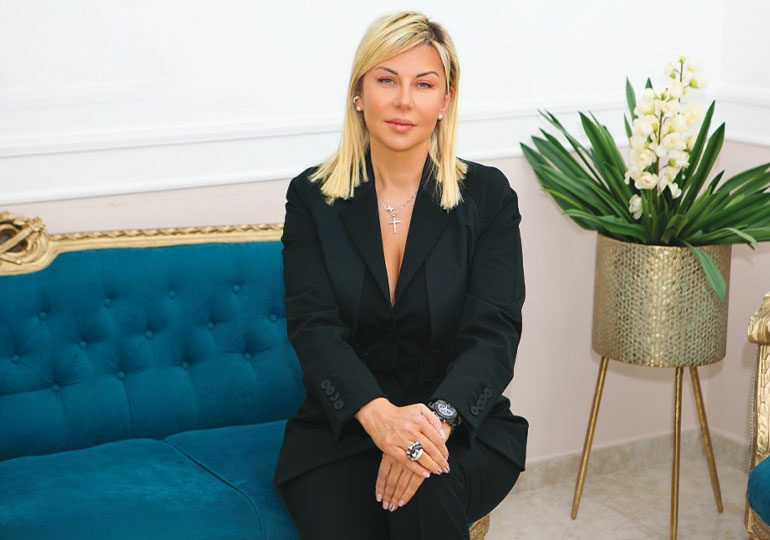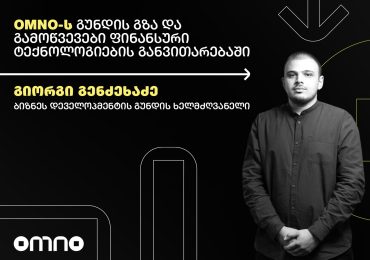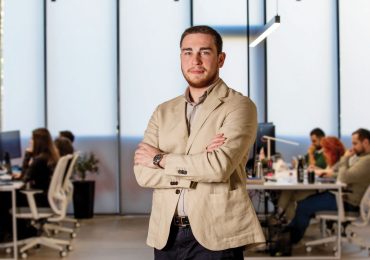The introduction of innovative hair transplants in Georgia is associated with the name of Dea Papaskiri. A plastic surgeon by profession, she used her fifteen years of experience in the field to establish the DeaMed clinic in 2018. The team of highly qualified doctors at the clinic offer customers hair transplant services using the latest technology available.
Dea Papaskiri established a specialist hair transplantation department in a clinic with Aleksi Makharashvili in Moscow in 2003, which is still operating today.
In 2004, she began training personnel in Georgia. Within eight months, she managed to assemble a highly qualified team of doctors and nurses, allowing her to establish Hairline International, where she was head surgeon until 2018. Afterwards, she founded the DeaMed clinic.
Dea Papaskiri has been a member of the International Society of Hair Restoration Surgery since 2009. In 2010, she completed her PhD thesis on the subject of Surgical Treatment of Patients with Scar Defects on the Hairy Area of the Head, demonstrating that hair can be implanted into scar tissue, and will not only restore hair growth, but also improve the structure of the tissue. Prior to the publication of her thesis, it was widely believed that hair transplantation on scar tissue was not possible.
Let us start with some figures. How big is the demand for hair transplantation in Georgia, and who are your main customers in terms of gender and age?
Hair transplantation is becoming more and more popular each year. Our male customers significantly outnumber women by three to one. As for the age groups, people are becoming affected by androgenetic alopecia from an increasingly younger age. Consequently, we are being contacted by customers as young as twenty. Most of our clients are men in the twenty-five to fifty-five age group. However, we also have patients above sixty-five years of age.
You have worked in this industry in Georgia for the past eighteen years. How has hair transplantation methodology developed over this period, and at what stage of development do we currently find ourselves in?
I started working in the hair transplantation industry in 2003 in Moscow, before returning to Georgia in 2005. Naturally, eighteen years is a long time in medicine. There have been numerous developments in the industry over this period. Technology has improved considerably. I regularly participate in various international conferences and make sure that the latest technology is implemented at our clinic. In 2019, I attended the 19th congress of the International Society of Hair Restoration Surgery (ISHRS) in Bangkok, where global experts and other attendees unanimously recognized the Trivellini system of follicular unit extraction (FUE) as the leading hair transplantation technique. We imported this technique to Georgia and implemented it at DeaMed. We can, therefore, confidently say that Georgia is one of the leaders with regards to hair transplantation technology.

Comfort is no longer enough for patients. Nowadays they are looking for quick high-quality results. How confident can your potential clients be that DeaMed will deliver the desired outcome?
You are right! A clinic can be comfortable but lacking in modern technology and qualified personnel. Ideally, a clinic should offer all three – a comfortable environment, the latest technology, and highly competent staff. DeaMed aims to improve people’s quality of life. As a result, we work tirelessly to provide our patients with the most effective and safe treatments, ensuring successful operations, guaranteed results, and customer satisfaction.
What do people who wish to get a hair transplant need to know? For example, how painful is the procedure, and how long does the recovery process take?
Hair transplantation is a minimally invasive surgical procedure that removes hair follicles from the back of the head to balding parts. Only a person’s own hair can be used. The surgical procedure typically takes 4-5 hours, whereby the patient is free to take a small break in-between. Local anesthesia is used, and the whole procedure is painless. Patients can return to their normal lifestyle two or three days after surgery. The recovery period is typically four to five days, during which time red marks are visible on the scalp, before disappearing completely.
In which scenario can a hair transplant be unsuccessful? What do people need to consider after surgery?
The surgery will be successful if the patient’s condition is accurately assessed and correctly diagnosed, the surgery is carefully planned and performed by a qualified plastic surgeon using correctly chosen modern techniques.
A hair transplant is permanent, as the follicles are obtained from areas of constant hair growth that are not affected by androgens. The hair grows normally and does not require special care. Patients must wash their hair daily during the first month after surgery. If the patient is young and has weak hair in other areas of the head, we recommend that these areas are reinforced to prevent future hair loss and the need for another transplant.
Can hair transplantation also be used to restore eyebrows, beard, and other areas apart from the scalp?
Hair transplantation is the only effective treatment in the following cases: androgenetic alopecia, or hair loss, which can affect both males and females; to fill in scars caused by surgery or burns; and to restore eyebrows, eyelashes, beard, or moustache hair. Restoration of eyebrows among women and beards among men has become popular in recent years.
The shape of eyebrows can be damaged by accidents, burns, surgery, by genetic factors, low-quality dye, due to stress, and so on. In this case, an eyebrow transplant represents the ideal solution.
At first, eyebrow transplants were only carried out to restore fully or partially damaged eyebrows. Nowadays, women can change the shape, thickness, or even the location of their eyebrows.
Compared to other countries in our region and to European countries, the cost of cosmetic surgery in Georgia is quite low. How expensive is hair transplantation in Georgia, and is there demand from abroad?
Hair transplantation is generally quite expensive, especially in Europe. However, high prices do not always guarantee good quality. The cost of a hair transplant in Georgia starts from ₾1,500 for local citizens, while the average cost is usually approximately H3,500. Everything depends on the number of transplanted follicles and the extent of the problem area.
I can honestly say that patients in Georgia receive better service than in many developed countries, even though the prices at our clinic are considerably lower than abroad. That is why many foreign nationals come to DeaMed for surgery. They know that they will receive world class treatment with guaranteed results at an affordable cost.
Finally, could you describe the impact of the pandemic on your clinic? Did you manage to operate normally?
The pandemic has caused incalculable human, social, material, and economic damage to people. Nevertheless, our clinic continued to operate without any major interruption – naturally, in line with all the existing regulations. Our patients’ safety must be and is our top priority. As most people were working remotely during the pandemic, they had more free time. Resultantly, those who previously could not find time for a hair transplant managed to do so. Working remotely created additional comfort for our patients, as they could spend the entire five-to-seven-day recovery period at home. Additionally, our clinic offered services at special reduced rates during the pandemic, allowing even more clients to fulfil their dream.

















